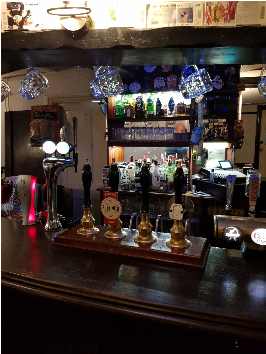Author’s Notes: The Four Bells Pub
The primary setting of my book is The Four Bells Pub, a pub in the fictional town of Lassingwood, in Oxfordshire. Why do Al and Maddy reconnect in a pub? Perhaps it was my romanticized view of the English pub, held by many of us Americans, that conjures up a cozy, inviting environment that inspired Samuel Pepys to dub the pub “The heart of England.”
Now, I’m not referring to a pub on street level in a London hotel, with shiny chrome or gold-plated fixtures, £500 upholstered leather stools, £20 plates of fish and chips, and a plentiful wait staff costumed straight out of Burberrys. The Four Bells, if it had existed, would have the look and feel of this image, which the talented Charlie Farrow created based on The Nag’s Head, in Berkshire, England:
The look & feel of The Four Bells, as created by artist Charlie Farrow
The real Nag’s Head, Berkshire, England
My wife Sue and I have had the good fortune to visit England several times, and on each trip we’ve made our way into what seemed to us to be quintessential English pubs. Some during walkabouts well away from center London, others in Brighton, Exeter, Plymouth, and several Cornish villages, to name a few.
Our English pub routine has been pretty consistent. Enter to a wary glance or two, and after giving our kindest nods in recognition, we’d approach the bar. Order clearly but not too loudly, and lay down as close to exact change as we could. Find a table—having learnt on an early trip that the choice table nearest the landlord was probably reserved for a regular. After settling in, feel the familiarity regular patrons took in their setting, a comfort we could never take, as it came to them over dozens and dozens of visits. Enjoy our drinks, but take care not to linger disproportionately to the time it takes to consume what we’ve paid for. Return our empties to the bar, give a soft smile and hit the road.
Brodie Curtis needs a break
So what is different from the American neighborhood tavern? I’d put it this way: Sue is an engaging, fearless conversationalist extraordinaire, but she hasn’t had much luck striking up conversations of more than a few words in an English pub despite her best efforts. But put her in a simple tavern in West Central Illinois where I’m from and she wouldn’t have any trouble ‘holding court’ for hours! Maybe our sample size in merry ‘ol England is too small, we’ll have to work on that.
A prop in the excerpt is a “Father Christmas automation” that was inspired by my memory of a gadget my parents put out each holiday season. It was a hand-me-down, from the mid-twentieth century, maybe earlier. When I put in a penny and Santa’s bell began to jingle, Christmas had come.
Excerpt from THE FOUR BELLS by Brodie Curtis
The Four Bells pub was just a short distance away, a low, two-storey building with nine-paned, leaded-glass windows that faced the street, underscored by empty wooden flower boxes which Al remembered were colored in the spring and summertime with marigolds and busy Lizzies. Its pub sign was a handsome red, green, and white medieval crest with four church bells arranged in a diamond pattern. At the heavy wooden double doors he paused, anticipating the refreshment waiting beyond, then pushed at the shining brass handle and was welcomed into the familiar fug of coal fire, beer, and cigarettes.
Al wiped his feet on the coconut fiber doormat and hung his overcoat and hat on the stand.
The pub seemed different since his last visit, two years before. The walls were brighter than he remembered, with years’ worth of smoky hues stripped away and painted over. The worn bar top had been replaced with lacquered hardwood, and the wooden stools were new and topped with leather cushions, a surprising and pleasant improvement that would provide welcome relief for the ache in his leg. A small Christmas tree stood in the nearest corner, adorned with tinsel, tin bulbs painted red and green, and a few candy cane sticks in wrappers. But Al hadn’t remembered George the landlord changing the place since before the War. And where was George?
Al scanned the room. A dozen tables stood on the parquet flooring, which gleamed, faintly – and surely that was new, too. Four tables had customers: an older couple, a group of young men, old Walt Turley and his friend whom Al didn’t recognize, and a couple in their early twenties. The hardwood tabletops and chairs shone with a rich, varnished finish that also seemed new. A cheery-faced Father Christmas automaton was on display, on a rickety high-legged side table that had been put out ever since Al was a lad; a fresh coat of varnish had covered the table’s splinters and splotchy finish. The jolly, white-haired little man sat on a tin roof-top with a bell in his hand, beckoning for a penny to start his act. Al gave him a happy pat on his red velvet cap as he approached the bar. He was thinking of Eddie and their mates Big Billy and Phillip before the four of them had set off for the War. If he closed his eyes he’d see his friends’ faces as they had been years before, right here in this room. Their smiles were vivid in his mind, as was the easy banter that had played among them. But his mates were gone, all buried in Belgium, and the bar stools were empty.


